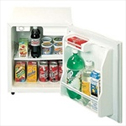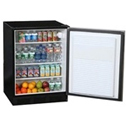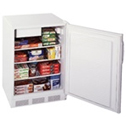While refrigerators are mainly used in clinical laboratories to store delicate samples, enzymes and other reagents, freezers help with safe vaccine storage. These temperature-controlled units come in various sizes, from space-saving benchtop models and under-counter units to floor models for storing larger quantities of materials. Certain refrigerator/freezer units are designed specifically for the safe storage of flammable materials.
Popular Models of Freezers and Refrigerators
Industry leader Summit Appliances offers different models of laboratory freezers/refrigerators designed to serve varying needs. Here are some of the popular models in the market:
This commercial frost-free freezer unit can store and preserve vaccines and medicines for a longer time. It comes with front-mounted door lock, adjustable shelves, 3-prong grounded cord, flat door liner and fan forced circulation.

The CFC free Summit S19R refrigerator-freezer is ideal to store important lab materials that require a constant temperature. This compact unit with locks promotes efficiency with an adjustable thermostat, manual defrost facility, and door storage for larger bottles.

Used for built-in applications, this under-counter all-refrigerator model features fan cooled compressor, automatic defrost, adjustable thermostat and front mounted lock. This model is U.L. listed, ETL sanitary approved and CalCode compliant.
Safe Use
Failure to adhere to good practices in the use of lab refrigerators and freezers can pose many risks such as the danger of contamination and bacterial growth. Lack of proper sample documentation can result in the accumulation of thousands of tubes containing old samples which are not relevant any more. The following safety tips can help in the proper use of these temperature-controlled units:
- Make sure the containers used to store samples are not leaky
- Warm chemicals to room temperature before sealing to prevent pressure buildup
- All items stored in a refrigerator must be appropriately dated and labeled
- Store and seal the compounds in refrigerators properly to prevent degradation
- Clean-out and manually defrost these devices at least annually or more frequently as needed
- In case of a broken container, leak or spill, clean and decontaminate with cleanser and disinfectant
- Locate the device away from laboratory exits
- The refrigerator should be connected to a suitable UPS system to prevent loss of valuable cultures and chemicals in the event of a power failure
- Do not store food or beverages in lab refrigerators/freezers
- The unit should be labeled to indicate whether or not it is safe for storage of flammable materials
Make sure that all the containers placed in the lab refrigerator/freezer are completely sealed or capped and safely positioned/securely placed in secondary containers or catch pans.



